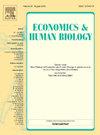Auspicious years, the birth of girls, and their birth outcomes
IF 1.8
3区 医学
Q2 ECONOMICS
引用次数: 0
Abstract
The literature suggests that parents intentionally time births, with one example being the increase in births during auspicious years according to Chinese cultural beliefs. We examine births, particularly those of girls, in 2007, a year considered auspicious in South Korea as the Year of the Golden Pig in the Chinese zodiac. In that year, the total number of births in the country surged by 10 %, reaching 496,677 compared to 453,170 in the previous year, before decreasing to 460,480 the following year. This increase suggests that having a baby, regardless of sex, was prioritized over having a boy in a country with a tradition of son preference, indicating that girls who might otherwise have been aborted were born. We found that in 2007, there was a 1 percentage point increase in the number of girls born in regions with a son-preferring culture. Additionally, girls born in 2007 weighed less compared to those born in previous years, suggesting that some may not have received adequate prenatal care.
吉祥年,女孩的出生,以及她们的出生结果
文献表明,父母有意安排生育时间,其中一个例子是根据中国文化信仰,吉祥年的出生率增加。我们研究了2007年出生的婴儿,尤其是女孩,这一年在韩国被认为是吉祥的一年,因为在中国十二生肖中是金猪年。在这一年,全国的出生人数从前一年的453170人增加到496677人,增加了10. %,之后又减少到460480人。这一增长表明,在一个重男轻女的传统国家,生一个孩子,无论性别,都比生一个男孩更重要,这表明原本可能会被打掉的女孩出生了。我们发现,2007年,在重男轻女文化地区出生的女孩数量增加了1个百分点。此外,与前几年出生的女孩相比,2007年出生的女孩体重较轻,这表明有些女孩可能没有得到充分的产前护理。
本文章由计算机程序翻译,如有差异,请以英文原文为准。
求助全文
约1分钟内获得全文
求助全文
来源期刊

Economics & Human Biology
医学-公共卫生、环境卫生与职业卫生
CiteScore
4.50
自引率
12.00%
发文量
85
审稿时长
61 days
期刊介绍:
Economics and Human Biology is devoted to the exploration of the effect of socio-economic processes on human beings as biological organisms. Research covered in this (quarterly) interdisciplinary journal is not bound by temporal or geographic limitations.
 求助内容:
求助内容: 应助结果提醒方式:
应助结果提醒方式:


